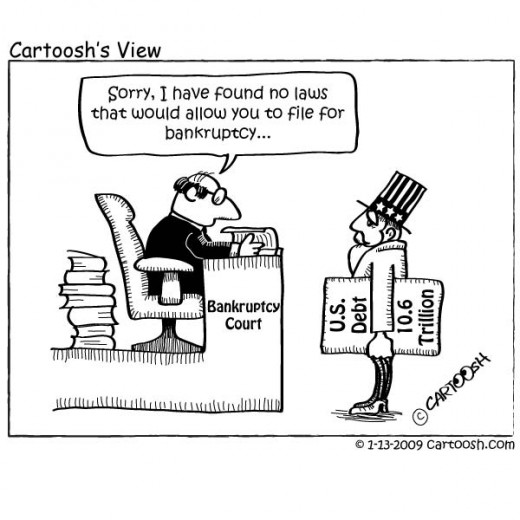Is Filing Bankruptcy Best For Me?
What Type of Bankruptcies are There?
Is Filing for Bankruptcy Right for Me?
In the current shaky economy, filings for bankruptcy are on the rise every day. Millions of people are finding themselves without any other alternative when it comes to paying their debts.
But is filing for bankruptcy the right thing for you? How do you know?
Are there different forms of bankruptcy and how do they differ?
If you file for bankruptcy, will you have a black X on your credit for the rest of your life?
Will you ever be able to get credit again?
These are all terrifying questions for most people. While filing bankruptcy may not be the right answer for you, let's examine the ins and outs of bankruptcy petitions and how they work.
Then look at your finances and decide if that's the right avenue for you to take.

CHAPTER 7 BANKRUPTCY
Chapter 7 bankruptcy is called the liquidation form of bankruptcy or the "straight" method. When the person in debt files for bankruptcy, all assets become the property of the trustee.
Who is the trustee? The trustee is usually an individual appointed by the court in charge of the bankruptcy proceedings themselves and in charge of administering the way the debt is handled or paid back if at all.
This trustee in Chapter 7 sells all the assets and distributes what money was made among the creditors.
The person in debt is no longer in debt.....other than any debts not covered by the bankruptcy filing.
In filing Chapter 7, the creditors cannot ever come back and try and claim repayment. What they get from the trustee is all she wrote more or less.
You can only file for Chapter 7 bankruptcy every 7 years.

CHAPTER 13 BANKRUPTCY
Filing Chapter 13 bankruptcy is a type of situation where the person in debt actually continues to pay on his debts. The person in debt gets to keep most of his or her property because of that.
However, the person who's in debt has to provide a plan of repayment of money that's owed which is then reviewed by the trustee, the creditors as well as the Bankruptcy Court.
The plan has to be reasonable in terms of repayment figures and the plan also has to be doable by the debtor. If the person filing bankruptcy doesn't have the income to support the repayment plan, it will be denied.
The plan is monitored by the trustee if approved. All funds for payment go to the trustee, who then in turn pays the creditors.
These plans run usually for 3 years but no more than 5 years. However, the debtor remains under court supervision for the life of the plan....so up to 5 years. He or she cannot make new debts or acquire any new assets without court permission.
If the person in debt proposes a plan of repayment which is less than full payment to unsecured creditors (credit card debt for instance), the person in debt will be made to live on a budget for the duration of the plan and will pay all excess money to the creditors.
If the debtor doesn't make the plan payments, any creditor can petition the court to convert the bankruptcy to a liquidation bankruptcy to collect.
Also, with Chapter 13 bankruptcy, even if the debts are paid in full, the bankruptcy will still remain on credit reports.

CHAPTER 11 BANKRUPTCY
Chapter 11 bankruptcy usually involves corporate debt or people who are engaged in commercial debt.
In this kind of bankruptcy, the corporation or the people involved in a small business for instance try and stay open for business while paying the debt back.
It usually involves restructuring the debt under court supervision so that it is paid back in a timely fashion.
The company in debt also gets to keep the business going and can retain their assets.

Is Filing Bankruptcy Best for Me?
Now that we know what kinds of bankruptcy are there to file for, still the burning question remains....is filing bankruptcy best for me? Let's look at some more facts.
NOT ALL BANKRUPTCIES ARE CREATED EQUAL
Chapter 7 bankruptcy could be disastrous for a business because the court could take the assets to repay creditors. That's why Chapter 11 would work better for someone who is operating a business or for corporations. It can give businesses a year from the time the bankruptcy is filed to have an acceptable plan and then begin putting it into play.
Chapter 7 bankruptcy is the most common bankruptcy. Usually the debt evaporates within 90 days and the person in debt can keep some assets. You generally never lose "everything" by filing Chapter 7. But.....the myth is that all debt is wiped out by Chapter 7 bankruptcy. Child support and alimony, student loans and debts that were incurred by fraud will not go away and the person in debt will be required to pay them!
Filing for bankruptcy under Chapter 7 or 11 will stop the IRS or state tax collection agencies from trying to collect taxes. But under bankruptcy filing laws, tax collection will start up again after filing.
Tax obligations cannot be erased by filing bankruptcy and interest and penalties will continue to mount.
Under Chapter 13, there is no accumulation of interest and penalties and the taxes can be paid over the life of the financial plan of payback.
The only way, according to Tax Mama on the Internet, to be freed of tax debt is if you file all your returns and the taxes owed are at least 3 years old.
WHAT IF YOU'RE MARRIED ?
If you're married, both spouses do not have to file for bankruptcy. This applies usually in the case of most of the debt being in one person's name. However, if the debt is in both their names, if one person files, they will switch the debt to the other spouse, so it's best usually to file together.
WHAT HAPPENS TO MY CREDIT IF I FILE?
Your credit history and score may be damaged but the amazing thing is that it won't stop you from getting credit!
The bankruptcy claim will stay on your record for 10 years. If you continually file for bankruptcy every 7 or so years, of course that looks very bad!
If you have a zero balance on a credit card for instance when you file for bankruptcy, you may even be allowed to keep that card, or you will be able to apply for credit but it will be at subprime rates, which means lower credit limits and higher interest rates.
If a corporation or an individual files for bankruptcy, creditors can no longer come after you for payment. But, creditors are often allowed to take possession (repossess) property not being paid for.
There's no way around it in filing for bankruptcy.....your credit will be hurt.....and the only thing that you can do in the future to rebuild credit is by showing that you can pay your debts.

ARE THERE ALTERNATIVES TO FILING BANKRUPTCY?
Always contact your creditors. Explain your situation and try and work out a restructure plan so that you can pay your debts with payments that work in your situation.
Always seek out counseling before making any huge financial decisions such as declaring bankruptcy.
Find out what possessions you have that you won't be able to retain and what things you can keep.
Be sure to ask how long it will take to restore your credit and how best to go about that.
Bankruptcy is not the end of the world and is a solution to a problem for some people....but it isn't for everyone.
The trick is to find out if it is the best solution for
you before filing and to get some great advice before you decide to file.

More Reading on Bankruptcy and Is it Right For You?
- The 5 Things you Need to Know when Filing Bankruptcy
If you feel that you are drowning in debt and cannot see your way clear to paying your minimum monthly payments, you may be considering bankruptcy. If that is the case, there are several things that you... - Should Senior Citizens File Bankruptcy?
Senior citizens are frequently said to be enjoying their golden years. This tends to imply that all is well in their world; they have earned the right to happiness, relaxation and peace of mind. That is the... - Can I File Bankruptcy Twice - How Often Can You File...
You might have needed to file bankruptcy in the past and now you may be in debt and wondering if you can file bankruptcy again. The answer depends on what Chapter of bankruptcy you are planning to file and how... - Bankruptcy Loan - Banks That Loan People Who Have Fi...
Filing bankruptcy is never an easy decision for anyone and is usually a choice between a bad and a very bad financial future for themselves and their families. Bankruptees face extreme changes in their... - How To File Bankruptcy By Yourself Without a Lawyer ...
I live in Maryland and have found that many families are really struggling financially and are wondering if chapter 7 bankruptcy is the Answer and when to file bankruptcy. And they have no idea where to start in filing bankruptcy in Maryland. Many pe - Things to Do Before Filing Bankruptcy
Many years ago my husband and I had many things happen that caused us to feel like we had to file bankruptcy. That was a very hard decision, but we didn't feel we had a choice. Between several health... - The bank's foreclosing on me, what do I do?
Far too often in a faltering economy, many people face bank foreclosures. There are several reasons for bank foreclosures. Most often the main reasons have to do with some unexpected circumstance such as job... - Using Free Government Financial Hardship Grants For ...
When trying to quickly pay off credit card debts, many people actually forgot about applying for free government grants for debt relief assistance. This is probably because these free debt relief grant money... - Chapter 7 Bankruptcy Information-What You Should Kno...
What Is Chapter 7 Bankruptcy - How One Local Bankruptcy Attorney Helped Me Get My L...
Sometimes the testimonials of others can be very helpful when you're going through a major life change, such as those which might require the assistance of a bankruptcy attorney for example. If you are on the... - Is Chapter 7 or 13 Right For Me?
Assuming you find yourself in a serious financial situation, there is a lot to understand about consumer bankruptcy before filing. One of the most important things to figure out is what sort of... - Is Bankruptcy Right For Me?
For the most part, the clients I see daily come into the office wondering if bankruptcy is right for them. After all, they heard that bankruptcy will damage their credit for ten years, right? Or, that the new...









